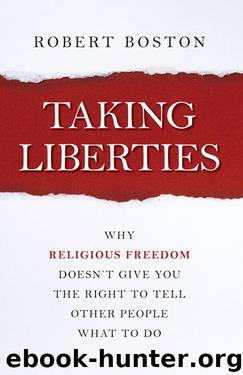Taking Liberties: Why Religious Freedom Doesn't Give You the Right to Tell Other People What to Do by Boston Robert

Author:Boston, Robert [Boston, Robert]
Language: eng
Format: epub
ISBN: 9781616149123
Publisher: Prometheus Books
Published: 2014-03-04T00:00:00+00:00
The interaction of religion and politics raises two issues, one relatively straightforward and one more nuanced.
The straightforward issue concerns what United States law says about nonprofit organizations and how they may intervene in politics. The more nuanced issue raises questions of how religious groups can speak to political leaders and advocate for their ideas in a democratic, pluralistic society that places a premium on individual rights and self-determination.
We’ll begin with what the law says. First off, nothing in the law prevents religious groups from advocating for their positions in the political arena. Houses of worship, like any other interest group, have the right to speak out. There is a long history of this in the United States. Over the years, churches have been all over the map on any number of political controversies.
Religious Right activists are fond of pointing out that some clergy during the colonial period supported the call for revolution. This is certainly true; some did. Others took the opposite view. The implication by the religious Right is that this long record of political intervention by members of the clergy somehow validates political activity being undertaken today by the politicized clergy of the religious Right. It’s a strange argument.
As usual, the religious Right fails to get the point. Complaints are raised over church involvement in politics not because the church is involved; it’s because of what the church is trying to achieve. Few Americans seriously expect houses of worship to be entirely apolitical. All Americans are asking is that churches play by some basic ground rules.
In the United States, those rules are clear: nonprofit organizations may not use tax-exempt resources to endorse or oppose candidates for public office. Note that this rule is limited to candidates, not issues. The thinking is that nonprofit status, which is a very desirable benefit extended to groups that are supposedly operating in the public interest, should not be abused. In other words, a nonprofit group can’t expect to behave like a political action committee (PAC) and get away with it.
Religious Right groups don’t see it this way. To them, the restriction on partisan endorsements of candidates is a violation of free speech and religious freedom. They overlook one salient point: no one is forcing them to be tax exempt. A house of worship that seeks to intervene in partisan politics by endorsing or opposing candidates has the option to surrender its tax exemption. They never want to do this.
Once again, we see an instance where powerful churches want (and, in fact, demand) a lucrative government benefit and then insist that they don’t want to follow the rules that come with said government benefit.
The simple truth is that tax exemption comes with a number of conditions. How could it be any other way? The Internal Revenue Service (IRS) must have some way of policing tax exemption, or the concept would be abused by sham organizations that simply don’t want to pay taxes.
Generally speaking, most organizations in the United States that are tax exempt operate under Section 501 (c)(3) of the Internal Revenue Code.
Download
This site does not store any files on its server. We only index and link to content provided by other sites. Please contact the content providers to delete copyright contents if any and email us, we'll remove relevant links or contents immediately.
| Anarchism | Communism & Socialism |
| Conservatism & Liberalism | Democracy |
| Fascism | Libertarianism |
| Nationalism | Radicalism |
| Utopian |
The Secret History by Donna Tartt(19053)
The Social Justice Warrior Handbook by Lisa De Pasquale(12187)
Thirteen Reasons Why by Jay Asher(8894)
This Is How You Lose Her by Junot Diaz(6877)
Weapons of Math Destruction by Cathy O'Neil(6267)
Zero to One by Peter Thiel(5787)
Beartown by Fredrik Backman(5737)
The Myth of the Strong Leader by Archie Brown(5500)
The Fire Next Time by James Baldwin(5431)
How Democracies Die by Steven Levitsky & Daniel Ziblatt(5216)
Promise Me, Dad by Joe Biden(5144)
Stone's Rules by Roger Stone(5081)
A Higher Loyalty: Truth, Lies, and Leadership by James Comey(4954)
100 Deadly Skills by Clint Emerson(4921)
Rise and Kill First by Ronen Bergman(4780)
Secrecy World by Jake Bernstein(4741)
The David Icke Guide to the Global Conspiracy (and how to end it) by David Icke(4709)
The Farm by Tom Rob Smith(4502)
The Doomsday Machine by Daniel Ellsberg(4484)
